Acorn Tourism: Destination Marketing Strategies and Analysis Report
VerifiedAdded on 2023/01/12
|12
|3997
|21
Report
AI Summary
This report, prepared for Acorn Tourism Development Consultant, delves into the core principles of destination marketing. It begins by evaluating how marketing planning supports destination promotion, using examples like London and Edinburgh. The report then analyzes key elements of successful destination marketing campaigns, examining how objectives were met in campaigns for destinations such as Iceland and India, considering target audiences, goals, budgets, content development, and audience engagement. The report further reviews the digital marketing tools utilized for promoting destinations, emphasizing the cost-effectiveness and reach of online platforms. It also examines the role and services of Destination Marketing Organizations (DMOs) and assesses the challenges they face in marketing destinations. The report includes examples such as Turkey and the use of social media. The report concludes with a summary that underscores the importance of defining goals, understanding target audiences, and utilizing effective marketing strategies to drive tourism and maximize visitor engagement. This report provides a comprehensive overview of destination marketing, its key components, and the challenges and opportunities within the field.
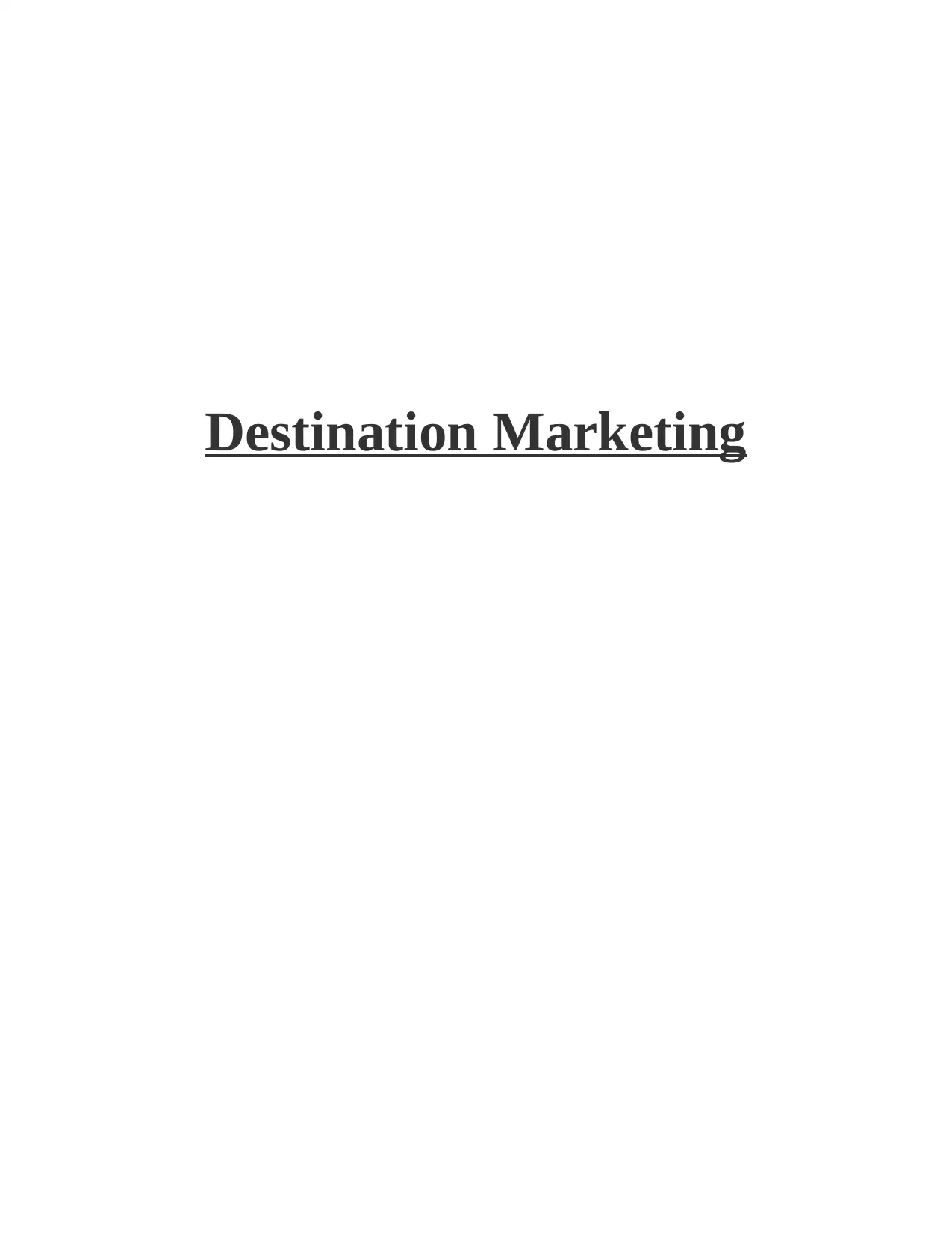
Destination Marketing
Paraphrase This Document
Need a fresh take? Get an instant paraphrase of this document with our AI Paraphraser
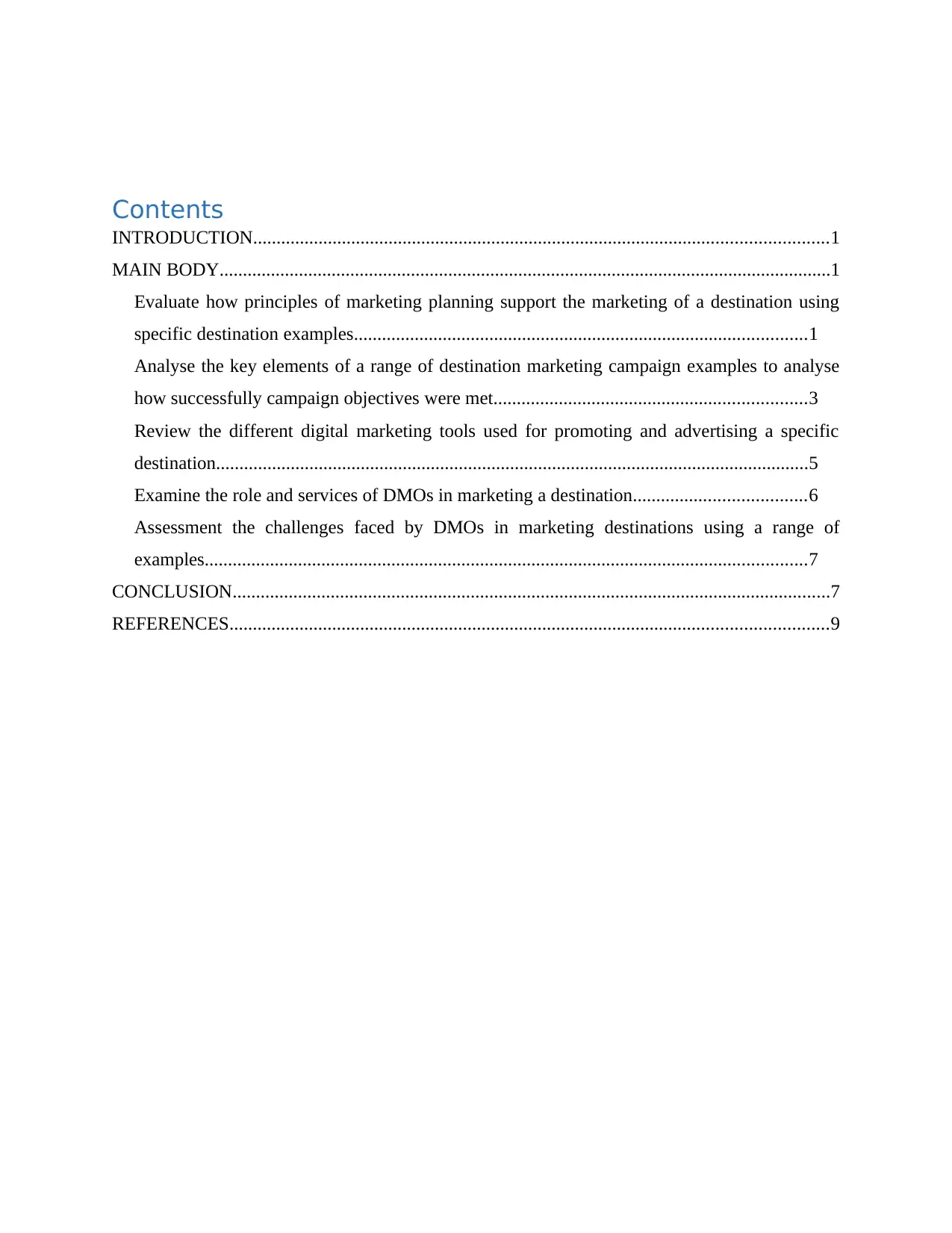
Contents
INTRODUCTION...........................................................................................................................1
MAIN BODY...................................................................................................................................1
Evaluate how principles of marketing planning support the marketing of a destination using
specific destination examples.................................................................................................1
Analyse the key elements of a range of destination marketing campaign examples to analyse
how successfully campaign objectives were met...................................................................3
Review the different digital marketing tools used for promoting and advertising a specific
destination...............................................................................................................................5
Examine the role and services of DMOs in marketing a destination.....................................6
Assessment the challenges faced by DMOs in marketing destinations using a range of
examples.................................................................................................................................7
CONCLUSION................................................................................................................................7
REFERENCES................................................................................................................................9
INTRODUCTION...........................................................................................................................1
MAIN BODY...................................................................................................................................1
Evaluate how principles of marketing planning support the marketing of a destination using
specific destination examples.................................................................................................1
Analyse the key elements of a range of destination marketing campaign examples to analyse
how successfully campaign objectives were met...................................................................3
Review the different digital marketing tools used for promoting and advertising a specific
destination...............................................................................................................................5
Examine the role and services of DMOs in marketing a destination.....................................6
Assessment the challenges faced by DMOs in marketing destinations using a range of
examples.................................................................................................................................7
CONCLUSION................................................................................................................................7
REFERENCES................................................................................................................................9
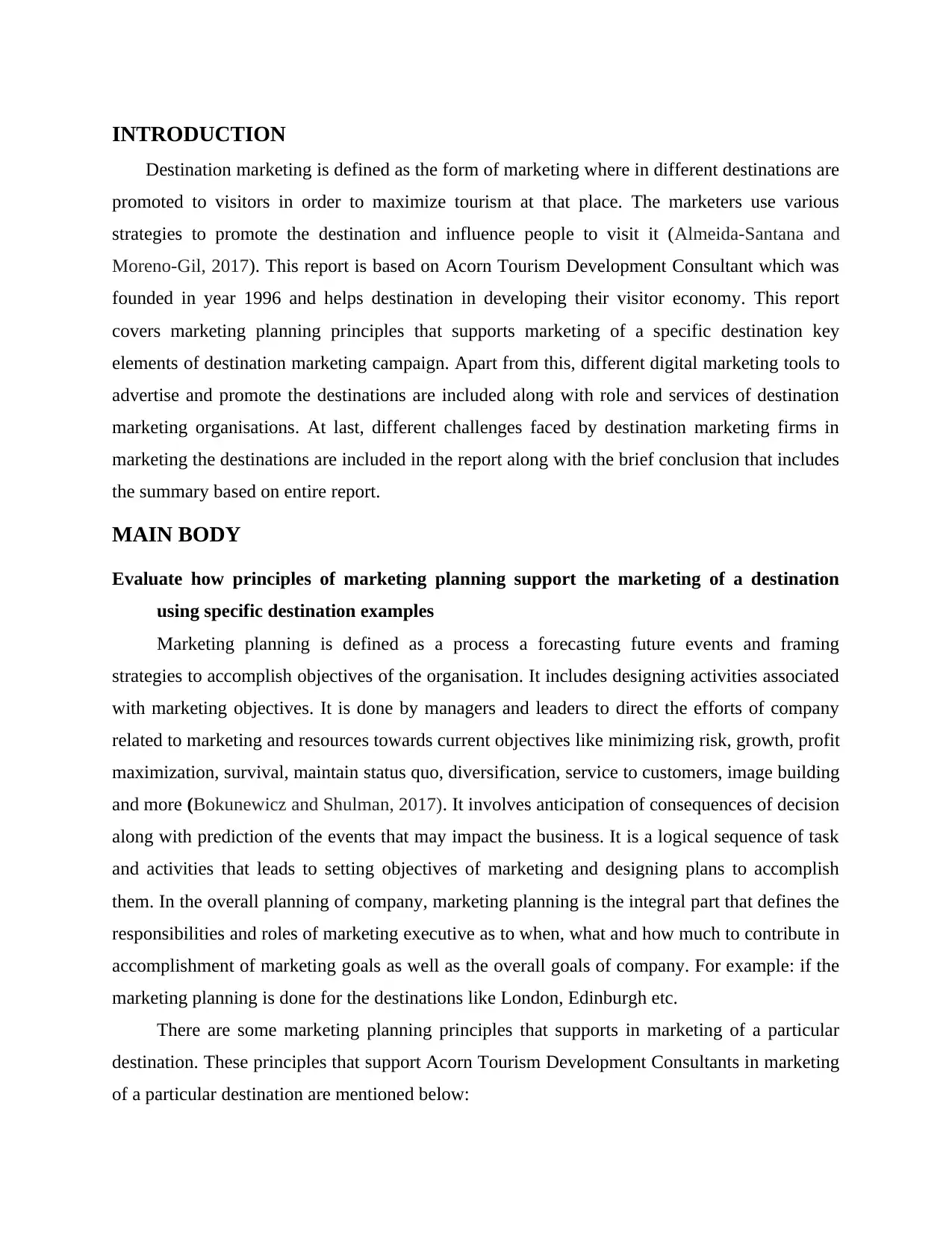
INTRODUCTION
Destination marketing is defined as the form of marketing where in different destinations are
promoted to visitors in order to maximize tourism at that place. The marketers use various
strategies to promote the destination and influence people to visit it (Almeida-Santana and
Moreno-Gil, 2017). This report is based on Acorn Tourism Development Consultant which was
founded in year 1996 and helps destination in developing their visitor economy. This report
covers marketing planning principles that supports marketing of a specific destination key
elements of destination marketing campaign. Apart from this, different digital marketing tools to
advertise and promote the destinations are included along with role and services of destination
marketing organisations. At last, different challenges faced by destination marketing firms in
marketing the destinations are included in the report along with the brief conclusion that includes
the summary based on entire report.
MAIN BODY
Evaluate how principles of marketing planning support the marketing of a destination
using specific destination examples
Marketing planning is defined as a process a forecasting future events and framing
strategies to accomplish objectives of the organisation. It includes designing activities associated
with marketing objectives. It is done by managers and leaders to direct the efforts of company
related to marketing and resources towards current objectives like minimizing risk, growth, profit
maximization, survival, maintain status quo, diversification, service to customers, image building
and more (Bokunewicz and Shulman, 2017). It involves anticipation of consequences of decision
along with prediction of the events that may impact the business. It is a logical sequence of task
and activities that leads to setting objectives of marketing and designing plans to accomplish
them. In the overall planning of company, marketing planning is the integral part that defines the
responsibilities and roles of marketing executive as to when, what and how much to contribute in
accomplishment of marketing goals as well as the overall goals of company. For example: if the
marketing planning is done for the destinations like London, Edinburgh etc.
There are some marketing planning principles that supports in marketing of a particular
destination. These principles that support Acorn Tourism Development Consultants in marketing
of a particular destination are mentioned below:
Destination marketing is defined as the form of marketing where in different destinations are
promoted to visitors in order to maximize tourism at that place. The marketers use various
strategies to promote the destination and influence people to visit it (Almeida-Santana and
Moreno-Gil, 2017). This report is based on Acorn Tourism Development Consultant which was
founded in year 1996 and helps destination in developing their visitor economy. This report
covers marketing planning principles that supports marketing of a specific destination key
elements of destination marketing campaign. Apart from this, different digital marketing tools to
advertise and promote the destinations are included along with role and services of destination
marketing organisations. At last, different challenges faced by destination marketing firms in
marketing the destinations are included in the report along with the brief conclusion that includes
the summary based on entire report.
MAIN BODY
Evaluate how principles of marketing planning support the marketing of a destination
using specific destination examples
Marketing planning is defined as a process a forecasting future events and framing
strategies to accomplish objectives of the organisation. It includes designing activities associated
with marketing objectives. It is done by managers and leaders to direct the efforts of company
related to marketing and resources towards current objectives like minimizing risk, growth, profit
maximization, survival, maintain status quo, diversification, service to customers, image building
and more (Bokunewicz and Shulman, 2017). It involves anticipation of consequences of decision
along with prediction of the events that may impact the business. It is a logical sequence of task
and activities that leads to setting objectives of marketing and designing plans to accomplish
them. In the overall planning of company, marketing planning is the integral part that defines the
responsibilities and roles of marketing executive as to when, what and how much to contribute in
accomplishment of marketing goals as well as the overall goals of company. For example: if the
marketing planning is done for the destinations like London, Edinburgh etc.
There are some marketing planning principles that supports in marketing of a particular
destination. These principles that support Acorn Tourism Development Consultants in marketing
of a particular destination are mentioned below:
⊘ This is a preview!⊘
Do you want full access?
Subscribe today to unlock all pages.

Trusted by 1+ million students worldwide
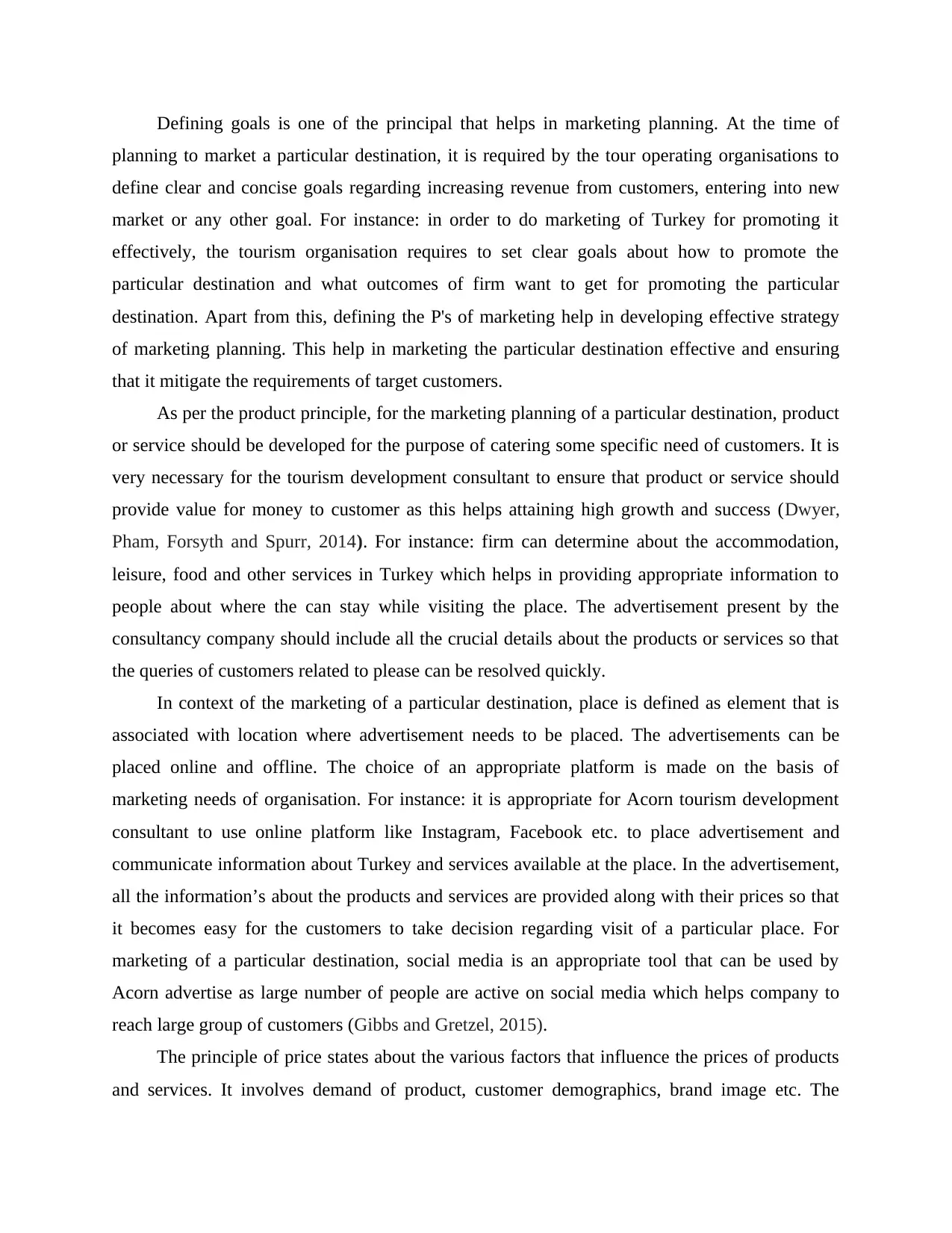
Defining goals is one of the principal that helps in marketing planning. At the time of
planning to market a particular destination, it is required by the tour operating organisations to
define clear and concise goals regarding increasing revenue from customers, entering into new
market or any other goal. For instance: in order to do marketing of Turkey for promoting it
effectively, the tourism organisation requires to set clear goals about how to promote the
particular destination and what outcomes of firm want to get for promoting the particular
destination. Apart from this, defining the P's of marketing help in developing effective strategy
of marketing planning. This help in marketing the particular destination effective and ensuring
that it mitigate the requirements of target customers.
As per the product principle, for the marketing planning of a particular destination, product
or service should be developed for the purpose of catering some specific need of customers. It is
very necessary for the tourism development consultant to ensure that product or service should
provide value for money to customer as this helps attaining high growth and success (Dwyer,
Pham, Forsyth and Spurr, 2014). For instance: firm can determine about the accommodation,
leisure, food and other services in Turkey which helps in providing appropriate information to
people about where the can stay while visiting the place. The advertisement present by the
consultancy company should include all the crucial details about the products or services so that
the queries of customers related to please can be resolved quickly.
In context of the marketing of a particular destination, place is defined as element that is
associated with location where advertisement needs to be placed. The advertisements can be
placed online and offline. The choice of an appropriate platform is made on the basis of
marketing needs of organisation. For instance: it is appropriate for Acorn tourism development
consultant to use online platform like Instagram, Facebook etc. to place advertisement and
communicate information about Turkey and services available at the place. In the advertisement,
all the information’s about the products and services are provided along with their prices so that
it becomes easy for the customers to take decision regarding visit of a particular place. For
marketing of a particular destination, social media is an appropriate tool that can be used by
Acorn advertise as large number of people are active on social media which helps company to
reach large group of customers (Gibbs and Gretzel, 2015).
The principle of price states about the various factors that influence the prices of products
and services. It involves demand of product, customer demographics, brand image etc. The
planning to market a particular destination, it is required by the tour operating organisations to
define clear and concise goals regarding increasing revenue from customers, entering into new
market or any other goal. For instance: in order to do marketing of Turkey for promoting it
effectively, the tourism organisation requires to set clear goals about how to promote the
particular destination and what outcomes of firm want to get for promoting the particular
destination. Apart from this, defining the P's of marketing help in developing effective strategy
of marketing planning. This help in marketing the particular destination effective and ensuring
that it mitigate the requirements of target customers.
As per the product principle, for the marketing planning of a particular destination, product
or service should be developed for the purpose of catering some specific need of customers. It is
very necessary for the tourism development consultant to ensure that product or service should
provide value for money to customer as this helps attaining high growth and success (Dwyer,
Pham, Forsyth and Spurr, 2014). For instance: firm can determine about the accommodation,
leisure, food and other services in Turkey which helps in providing appropriate information to
people about where the can stay while visiting the place. The advertisement present by the
consultancy company should include all the crucial details about the products or services so that
the queries of customers related to please can be resolved quickly.
In context of the marketing of a particular destination, place is defined as element that is
associated with location where advertisement needs to be placed. The advertisements can be
placed online and offline. The choice of an appropriate platform is made on the basis of
marketing needs of organisation. For instance: it is appropriate for Acorn tourism development
consultant to use online platform like Instagram, Facebook etc. to place advertisement and
communicate information about Turkey and services available at the place. In the advertisement,
all the information’s about the products and services are provided along with their prices so that
it becomes easy for the customers to take decision regarding visit of a particular place. For
marketing of a particular destination, social media is an appropriate tool that can be used by
Acorn advertise as large number of people are active on social media which helps company to
reach large group of customers (Gibbs and Gretzel, 2015).
The principle of price states about the various factors that influence the prices of products
and services. It involves demand of product, customer demographics, brand image etc. The
Paraphrase This Document
Need a fresh take? Get an instant paraphrase of this document with our AI Paraphraser
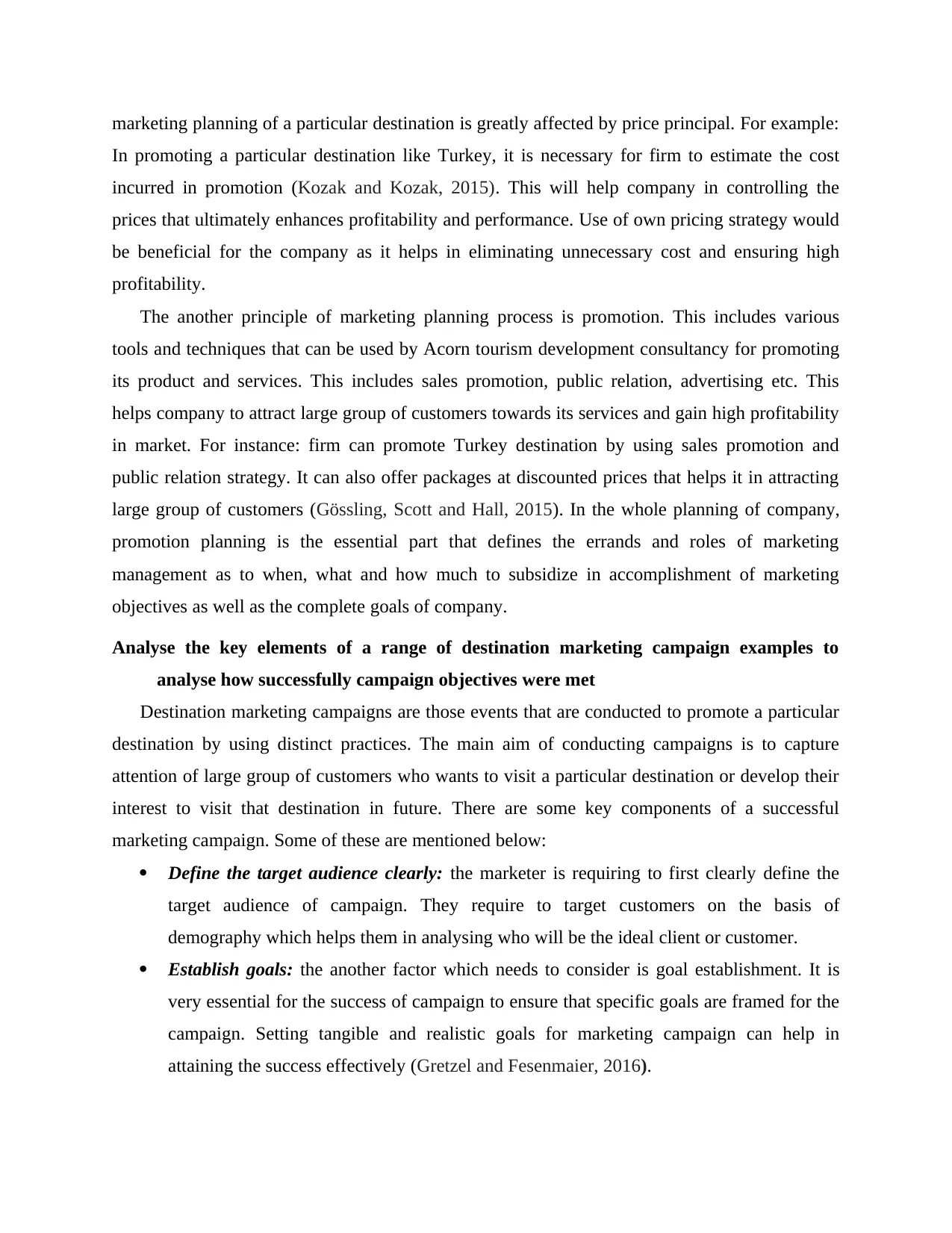
marketing planning of a particular destination is greatly affected by price principal. For example:
In promoting a particular destination like Turkey, it is necessary for firm to estimate the cost
incurred in promotion (Kozak and Kozak, 2015). This will help company in controlling the
prices that ultimately enhances profitability and performance. Use of own pricing strategy would
be beneficial for the company as it helps in eliminating unnecessary cost and ensuring high
profitability.
The another principle of marketing planning process is promotion. This includes various
tools and techniques that can be used by Acorn tourism development consultancy for promoting
its product and services. This includes sales promotion, public relation, advertising etc. This
helps company to attract large group of customers towards its services and gain high profitability
in market. For instance: firm can promote Turkey destination by using sales promotion and
public relation strategy. It can also offer packages at discounted prices that helps it in attracting
large group of customers (Gössling, Scott and Hall, 2015). In the whole planning of company,
promotion planning is the essential part that defines the errands and roles of marketing
management as to when, what and how much to subsidize in accomplishment of marketing
objectives as well as the complete goals of company.
Analyse the key elements of a range of destination marketing campaign examples to
analyse how successfully campaign objectives were met
Destination marketing campaigns are those events that are conducted to promote a particular
destination by using distinct practices. The main aim of conducting campaigns is to capture
attention of large group of customers who wants to visit a particular destination or develop their
interest to visit that destination in future. There are some key components of a successful
marketing campaign. Some of these are mentioned below:
Define the target audience clearly: the marketer is requiring to first clearly define the
target audience of campaign. They require to target customers on the basis of
demography which helps them in analysing who will be the ideal client or customer.
Establish goals: the another factor which needs to consider is goal establishment. It is
very essential for the success of campaign to ensure that specific goals are framed for the
campaign. Setting tangible and realistic goals for marketing campaign can help in
attaining the success effectively (Gretzel and Fesenmaier, 2016).
In promoting a particular destination like Turkey, it is necessary for firm to estimate the cost
incurred in promotion (Kozak and Kozak, 2015). This will help company in controlling the
prices that ultimately enhances profitability and performance. Use of own pricing strategy would
be beneficial for the company as it helps in eliminating unnecessary cost and ensuring high
profitability.
The another principle of marketing planning process is promotion. This includes various
tools and techniques that can be used by Acorn tourism development consultancy for promoting
its product and services. This includes sales promotion, public relation, advertising etc. This
helps company to attract large group of customers towards its services and gain high profitability
in market. For instance: firm can promote Turkey destination by using sales promotion and
public relation strategy. It can also offer packages at discounted prices that helps it in attracting
large group of customers (Gössling, Scott and Hall, 2015). In the whole planning of company,
promotion planning is the essential part that defines the errands and roles of marketing
management as to when, what and how much to subsidize in accomplishment of marketing
objectives as well as the complete goals of company.
Analyse the key elements of a range of destination marketing campaign examples to
analyse how successfully campaign objectives were met
Destination marketing campaigns are those events that are conducted to promote a particular
destination by using distinct practices. The main aim of conducting campaigns is to capture
attention of large group of customers who wants to visit a particular destination or develop their
interest to visit that destination in future. There are some key components of a successful
marketing campaign. Some of these are mentioned below:
Define the target audience clearly: the marketer is requiring to first clearly define the
target audience of campaign. They require to target customers on the basis of
demography which helps them in analysing who will be the ideal client or customer.
Establish goals: the another factor which needs to consider is goal establishment. It is
very essential for the success of campaign to ensure that specific goals are framed for the
campaign. Setting tangible and realistic goals for marketing campaign can help in
attaining the success effectively (Gretzel and Fesenmaier, 2016).
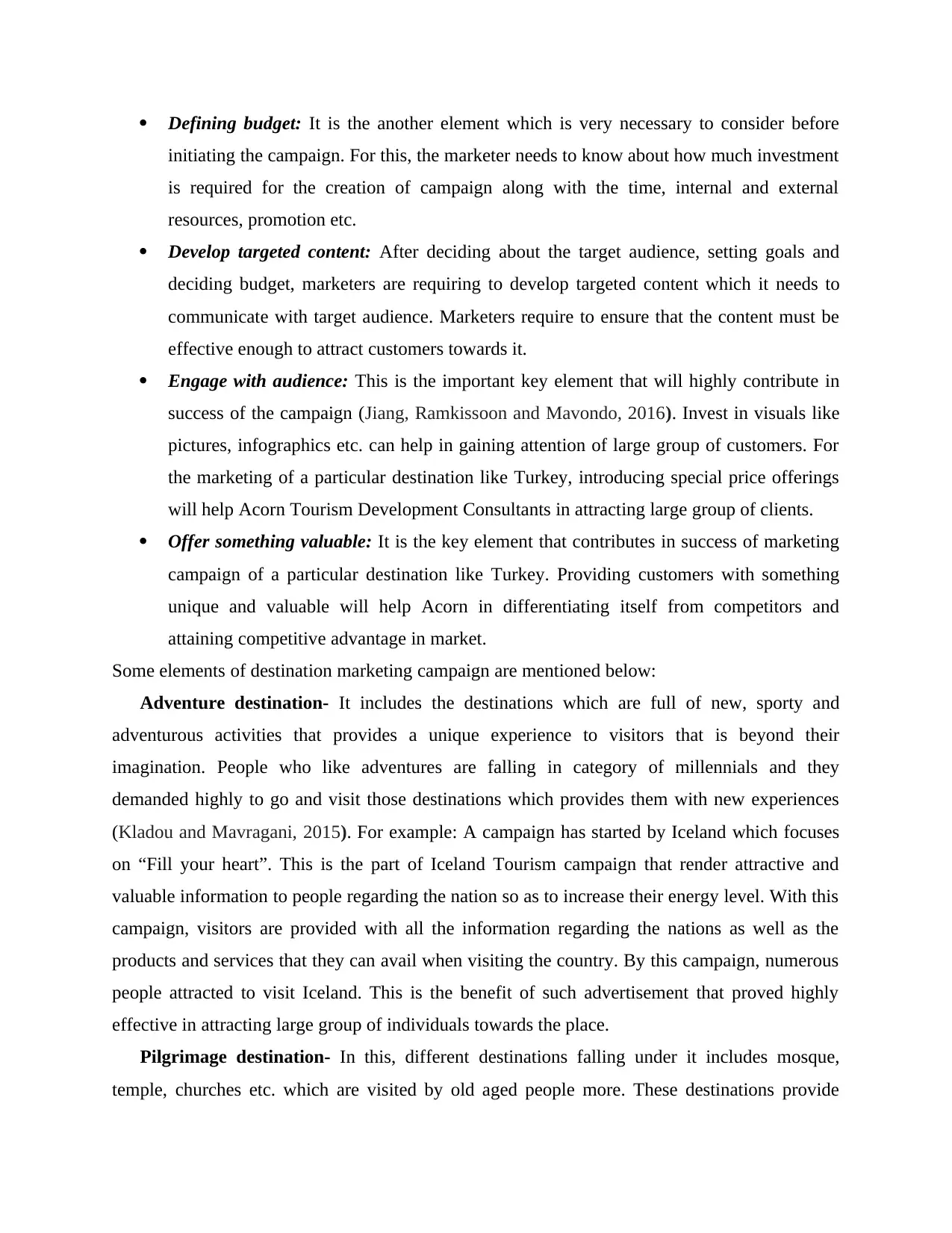
Defining budget: It is the another element which is very necessary to consider before
initiating the campaign. For this, the marketer needs to know about how much investment
is required for the creation of campaign along with the time, internal and external
resources, promotion etc.
Develop targeted content: After deciding about the target audience, setting goals and
deciding budget, marketers are requiring to develop targeted content which it needs to
communicate with target audience. Marketers require to ensure that the content must be
effective enough to attract customers towards it.
Engage with audience: This is the important key element that will highly contribute in
success of the campaign (Jiang, Ramkissoon and Mavondo, 2016). Invest in visuals like
pictures, infographics etc. can help in gaining attention of large group of customers. For
the marketing of a particular destination like Turkey, introducing special price offerings
will help Acorn Tourism Development Consultants in attracting large group of clients.
Offer something valuable: It is the key element that contributes in success of marketing
campaign of a particular destination like Turkey. Providing customers with something
unique and valuable will help Acorn in differentiating itself from competitors and
attaining competitive advantage in market.
Some elements of destination marketing campaign are mentioned below:
Adventure destination- It includes the destinations which are full of new, sporty and
adventurous activities that provides a unique experience to visitors that is beyond their
imagination. People who like adventures are falling in category of millennials and they
demanded highly to go and visit those destinations which provides them with new experiences
(Kladou and Mavragani, 2015). For example: A campaign has started by Iceland which focuses
on “Fill your heart”. This is the part of Iceland Tourism campaign that render attractive and
valuable information to people regarding the nation so as to increase their energy level. With this
campaign, visitors are provided with all the information regarding the nations as well as the
products and services that they can avail when visiting the country. By this campaign, numerous
people attracted to visit Iceland. This is the benefit of such advertisement that proved highly
effective in attracting large group of individuals towards the place.
Pilgrimage destination- In this, different destinations falling under it includes mosque,
temple, churches etc. which are visited by old aged people more. These destinations provide
initiating the campaign. For this, the marketer needs to know about how much investment
is required for the creation of campaign along with the time, internal and external
resources, promotion etc.
Develop targeted content: After deciding about the target audience, setting goals and
deciding budget, marketers are requiring to develop targeted content which it needs to
communicate with target audience. Marketers require to ensure that the content must be
effective enough to attract customers towards it.
Engage with audience: This is the important key element that will highly contribute in
success of the campaign (Jiang, Ramkissoon and Mavondo, 2016). Invest in visuals like
pictures, infographics etc. can help in gaining attention of large group of customers. For
the marketing of a particular destination like Turkey, introducing special price offerings
will help Acorn Tourism Development Consultants in attracting large group of clients.
Offer something valuable: It is the key element that contributes in success of marketing
campaign of a particular destination like Turkey. Providing customers with something
unique and valuable will help Acorn in differentiating itself from competitors and
attaining competitive advantage in market.
Some elements of destination marketing campaign are mentioned below:
Adventure destination- It includes the destinations which are full of new, sporty and
adventurous activities that provides a unique experience to visitors that is beyond their
imagination. People who like adventures are falling in category of millennials and they
demanded highly to go and visit those destinations which provides them with new experiences
(Kladou and Mavragani, 2015). For example: A campaign has started by Iceland which focuses
on “Fill your heart”. This is the part of Iceland Tourism campaign that render attractive and
valuable information to people regarding the nation so as to increase their energy level. With this
campaign, visitors are provided with all the information regarding the nations as well as the
products and services that they can avail when visiting the country. By this campaign, numerous
people attracted to visit Iceland. This is the benefit of such advertisement that proved highly
effective in attracting large group of individuals towards the place.
Pilgrimage destination- In this, different destinations falling under it includes mosque,
temple, churches etc. which are visited by old aged people more. These destinations provide
⊘ This is a preview!⊘
Do you want full access?
Subscribe today to unlock all pages.

Trusted by 1+ million students worldwide
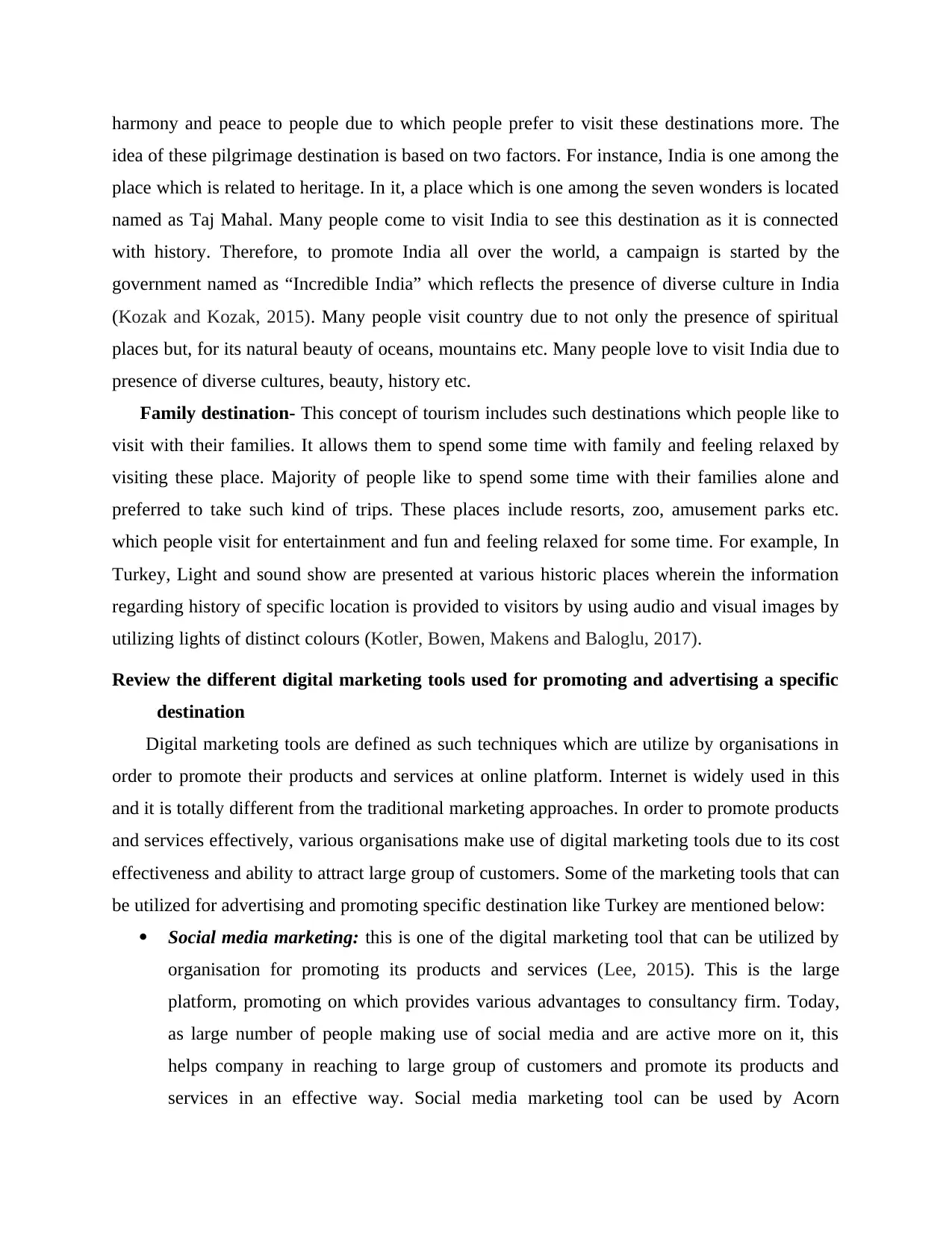
harmony and peace to people due to which people prefer to visit these destinations more. The
idea of these pilgrimage destination is based on two factors. For instance, India is one among the
place which is related to heritage. In it, a place which is one among the seven wonders is located
named as Taj Mahal. Many people come to visit India to see this destination as it is connected
with history. Therefore, to promote India all over the world, a campaign is started by the
government named as “Incredible India” which reflects the presence of diverse culture in India
(Kozak and Kozak, 2015). Many people visit country due to not only the presence of spiritual
places but, for its natural beauty of oceans, mountains etc. Many people love to visit India due to
presence of diverse cultures, beauty, history etc.
Family destination- This concept of tourism includes such destinations which people like to
visit with their families. It allows them to spend some time with family and feeling relaxed by
visiting these place. Majority of people like to spend some time with their families alone and
preferred to take such kind of trips. These places include resorts, zoo, amusement parks etc.
which people visit for entertainment and fun and feeling relaxed for some time. For example, In
Turkey, Light and sound show are presented at various historic places wherein the information
regarding history of specific location is provided to visitors by using audio and visual images by
utilizing lights of distinct colours (Kotler, Bowen, Makens and Baloglu, 2017).
Review the different digital marketing tools used for promoting and advertising a specific
destination
Digital marketing tools are defined as such techniques which are utilize by organisations in
order to promote their products and services at online platform. Internet is widely used in this
and it is totally different from the traditional marketing approaches. In order to promote products
and services effectively, various organisations make use of digital marketing tools due to its cost
effectiveness and ability to attract large group of customers. Some of the marketing tools that can
be utilized for advertising and promoting specific destination like Turkey are mentioned below:
Social media marketing: this is one of the digital marketing tool that can be utilized by
organisation for promoting its products and services (Lee, 2015). This is the large
platform, promoting on which provides various advantages to consultancy firm. Today,
as large number of people making use of social media and are active more on it, this
helps company in reaching to large group of customers and promote its products and
services in an effective way. Social media marketing tool can be used by Acorn
idea of these pilgrimage destination is based on two factors. For instance, India is one among the
place which is related to heritage. In it, a place which is one among the seven wonders is located
named as Taj Mahal. Many people come to visit India to see this destination as it is connected
with history. Therefore, to promote India all over the world, a campaign is started by the
government named as “Incredible India” which reflects the presence of diverse culture in India
(Kozak and Kozak, 2015). Many people visit country due to not only the presence of spiritual
places but, for its natural beauty of oceans, mountains etc. Many people love to visit India due to
presence of diverse cultures, beauty, history etc.
Family destination- This concept of tourism includes such destinations which people like to
visit with their families. It allows them to spend some time with family and feeling relaxed by
visiting these place. Majority of people like to spend some time with their families alone and
preferred to take such kind of trips. These places include resorts, zoo, amusement parks etc.
which people visit for entertainment and fun and feeling relaxed for some time. For example, In
Turkey, Light and sound show are presented at various historic places wherein the information
regarding history of specific location is provided to visitors by using audio and visual images by
utilizing lights of distinct colours (Kotler, Bowen, Makens and Baloglu, 2017).
Review the different digital marketing tools used for promoting and advertising a specific
destination
Digital marketing tools are defined as such techniques which are utilize by organisations in
order to promote their products and services at online platform. Internet is widely used in this
and it is totally different from the traditional marketing approaches. In order to promote products
and services effectively, various organisations make use of digital marketing tools due to its cost
effectiveness and ability to attract large group of customers. Some of the marketing tools that can
be utilized for advertising and promoting specific destination like Turkey are mentioned below:
Social media marketing: this is one of the digital marketing tool that can be utilized by
organisation for promoting its products and services (Lee, 2015). This is the large
platform, promoting on which provides various advantages to consultancy firm. Today,
as large number of people making use of social media and are active more on it, this
helps company in reaching to large group of customers and promote its products and
services in an effective way. Social media marketing tool can be used by Acorn
Paraphrase This Document
Need a fresh take? Get an instant paraphrase of this document with our AI Paraphraser
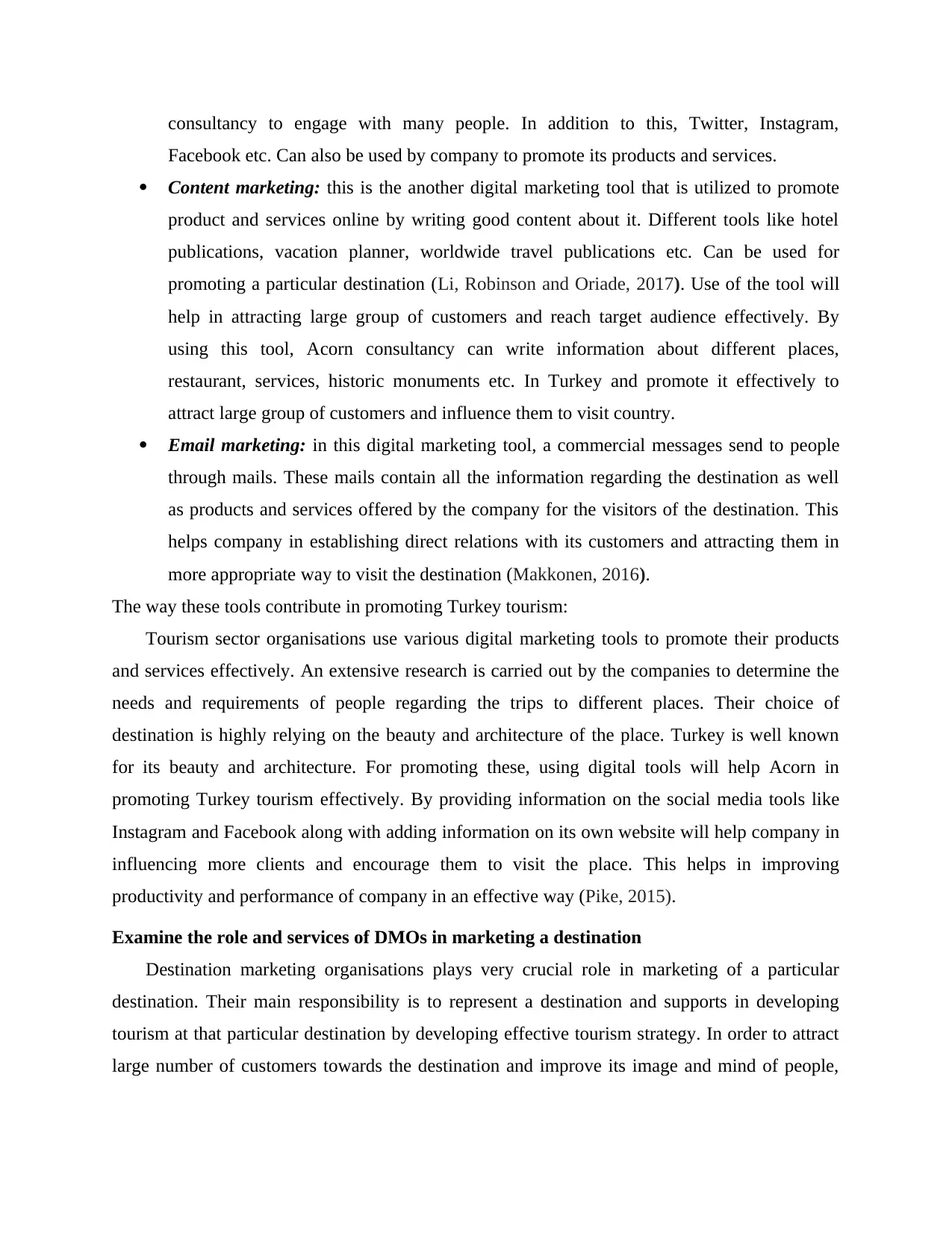
consultancy to engage with many people. In addition to this, Twitter, Instagram,
Facebook etc. Can also be used by company to promote its products and services.
Content marketing: this is the another digital marketing tool that is utilized to promote
product and services online by writing good content about it. Different tools like hotel
publications, vacation planner, worldwide travel publications etc. Can be used for
promoting a particular destination (Li, Robinson and Oriade, 2017). Use of the tool will
help in attracting large group of customers and reach target audience effectively. By
using this tool, Acorn consultancy can write information about different places,
restaurant, services, historic monuments etc. In Turkey and promote it effectively to
attract large group of customers and influence them to visit country.
Email marketing: in this digital marketing tool, a commercial messages send to people
through mails. These mails contain all the information regarding the destination as well
as products and services offered by the company for the visitors of the destination. This
helps company in establishing direct relations with its customers and attracting them in
more appropriate way to visit the destination (Makkonen, 2016).
The way these tools contribute in promoting Turkey tourism:
Tourism sector organisations use various digital marketing tools to promote their products
and services effectively. An extensive research is carried out by the companies to determine the
needs and requirements of people regarding the trips to different places. Their choice of
destination is highly relying on the beauty and architecture of the place. Turkey is well known
for its beauty and architecture. For promoting these, using digital tools will help Acorn in
promoting Turkey tourism effectively. By providing information on the social media tools like
Instagram and Facebook along with adding information on its own website will help company in
influencing more clients and encourage them to visit the place. This helps in improving
productivity and performance of company in an effective way (Pike, 2015).
Examine the role and services of DMOs in marketing a destination
Destination marketing organisations plays very crucial role in marketing of a particular
destination. Their main responsibility is to represent a destination and supports in developing
tourism at that particular destination by developing effective tourism strategy. In order to attract
large number of customers towards the destination and improve its image and mind of people,
Facebook etc. Can also be used by company to promote its products and services.
Content marketing: this is the another digital marketing tool that is utilized to promote
product and services online by writing good content about it. Different tools like hotel
publications, vacation planner, worldwide travel publications etc. Can be used for
promoting a particular destination (Li, Robinson and Oriade, 2017). Use of the tool will
help in attracting large group of customers and reach target audience effectively. By
using this tool, Acorn consultancy can write information about different places,
restaurant, services, historic monuments etc. In Turkey and promote it effectively to
attract large group of customers and influence them to visit country.
Email marketing: in this digital marketing tool, a commercial messages send to people
through mails. These mails contain all the information regarding the destination as well
as products and services offered by the company for the visitors of the destination. This
helps company in establishing direct relations with its customers and attracting them in
more appropriate way to visit the destination (Makkonen, 2016).
The way these tools contribute in promoting Turkey tourism:
Tourism sector organisations use various digital marketing tools to promote their products
and services effectively. An extensive research is carried out by the companies to determine the
needs and requirements of people regarding the trips to different places. Their choice of
destination is highly relying on the beauty and architecture of the place. Turkey is well known
for its beauty and architecture. For promoting these, using digital tools will help Acorn in
promoting Turkey tourism effectively. By providing information on the social media tools like
Instagram and Facebook along with adding information on its own website will help company in
influencing more clients and encourage them to visit the place. This helps in improving
productivity and performance of company in an effective way (Pike, 2015).
Examine the role and services of DMOs in marketing a destination
Destination marketing organisations plays very crucial role in marketing of a particular
destination. Their main responsibility is to represent a destination and supports in developing
tourism at that particular destination by developing effective tourism strategy. In order to attract
large number of customers towards the destination and improve its image and mind of people,
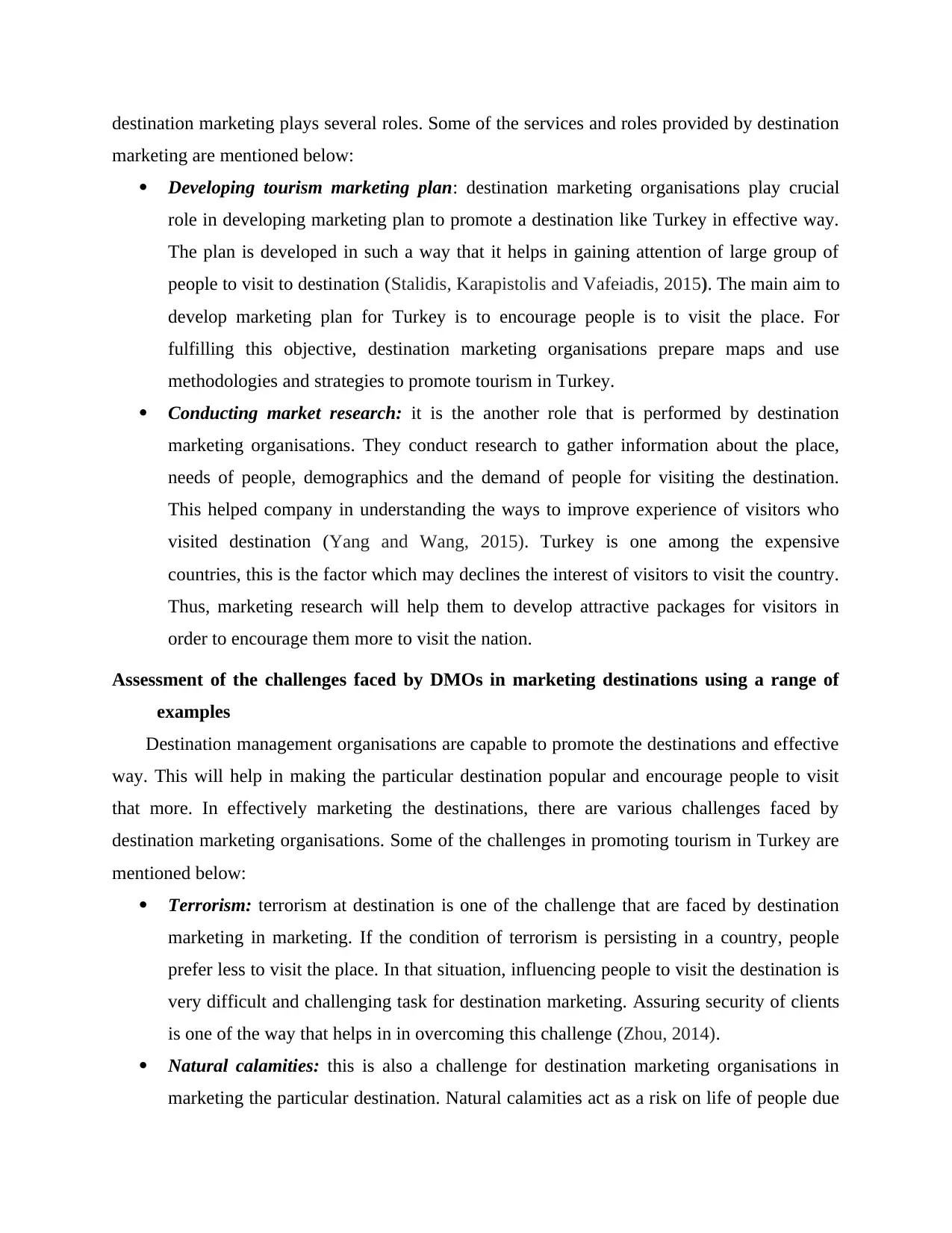
destination marketing plays several roles. Some of the services and roles provided by destination
marketing are mentioned below:
Developing tourism marketing plan: destination marketing organisations play crucial
role in developing marketing plan to promote a destination like Turkey in effective way.
The plan is developed in such a way that it helps in gaining attention of large group of
people to visit to destination (Stalidis, Karapistolis and Vafeiadis, 2015). The main aim to
develop marketing plan for Turkey is to encourage people is to visit the place. For
fulfilling this objective, destination marketing organisations prepare maps and use
methodologies and strategies to promote tourism in Turkey.
Conducting market research: it is the another role that is performed by destination
marketing organisations. They conduct research to gather information about the place,
needs of people, demographics and the demand of people for visiting the destination.
This helped company in understanding the ways to improve experience of visitors who
visited destination (Yang and Wang, 2015). Turkey is one among the expensive
countries, this is the factor which may declines the interest of visitors to visit the country.
Thus, marketing research will help them to develop attractive packages for visitors in
order to encourage them more to visit the nation.
Assessment of the challenges faced by DMOs in marketing destinations using a range of
examples
Destination management organisations are capable to promote the destinations and effective
way. This will help in making the particular destination popular and encourage people to visit
that more. In effectively marketing the destinations, there are various challenges faced by
destination marketing organisations. Some of the challenges in promoting tourism in Turkey are
mentioned below:
Terrorism: terrorism at destination is one of the challenge that are faced by destination
marketing in marketing. If the condition of terrorism is persisting in a country, people
prefer less to visit the place. In that situation, influencing people to visit the destination is
very difficult and challenging task for destination marketing. Assuring security of clients
is one of the way that helps in in overcoming this challenge (Zhou, 2014).
Natural calamities: this is also a challenge for destination marketing organisations in
marketing the particular destination. Natural calamities act as a risk on life of people due
marketing are mentioned below:
Developing tourism marketing plan: destination marketing organisations play crucial
role in developing marketing plan to promote a destination like Turkey in effective way.
The plan is developed in such a way that it helps in gaining attention of large group of
people to visit to destination (Stalidis, Karapistolis and Vafeiadis, 2015). The main aim to
develop marketing plan for Turkey is to encourage people is to visit the place. For
fulfilling this objective, destination marketing organisations prepare maps and use
methodologies and strategies to promote tourism in Turkey.
Conducting market research: it is the another role that is performed by destination
marketing organisations. They conduct research to gather information about the place,
needs of people, demographics and the demand of people for visiting the destination.
This helped company in understanding the ways to improve experience of visitors who
visited destination (Yang and Wang, 2015). Turkey is one among the expensive
countries, this is the factor which may declines the interest of visitors to visit the country.
Thus, marketing research will help them to develop attractive packages for visitors in
order to encourage them more to visit the nation.
Assessment of the challenges faced by DMOs in marketing destinations using a range of
examples
Destination management organisations are capable to promote the destinations and effective
way. This will help in making the particular destination popular and encourage people to visit
that more. In effectively marketing the destinations, there are various challenges faced by
destination marketing organisations. Some of the challenges in promoting tourism in Turkey are
mentioned below:
Terrorism: terrorism at destination is one of the challenge that are faced by destination
marketing in marketing. If the condition of terrorism is persisting in a country, people
prefer less to visit the place. In that situation, influencing people to visit the destination is
very difficult and challenging task for destination marketing. Assuring security of clients
is one of the way that helps in in overcoming this challenge (Zhou, 2014).
Natural calamities: this is also a challenge for destination marketing organisations in
marketing the particular destination. Natural calamities act as a risk on life of people due
⊘ This is a preview!⊘
Do you want full access?
Subscribe today to unlock all pages.

Trusted by 1+ million students worldwide
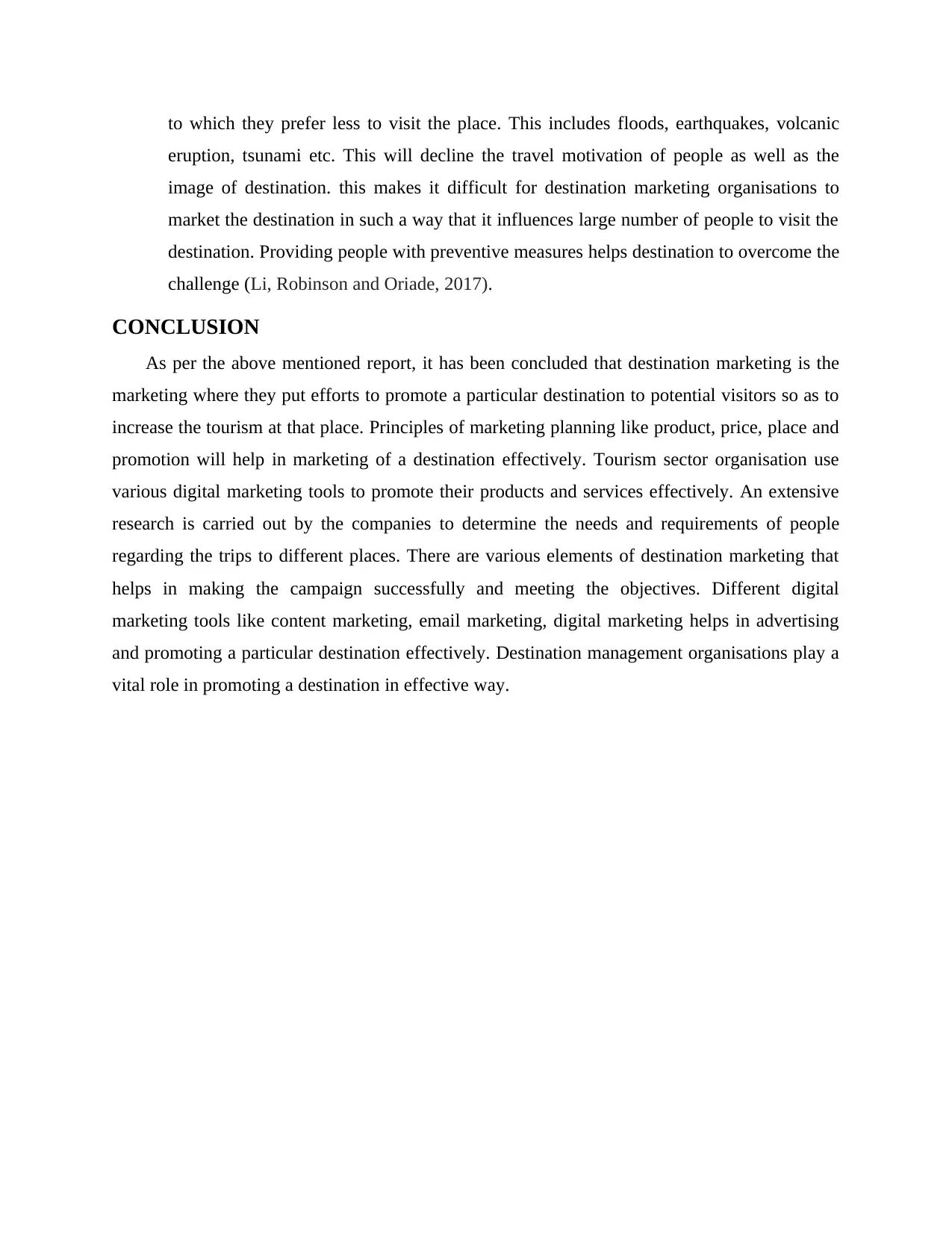
to which they prefer less to visit the place. This includes floods, earthquakes, volcanic
eruption, tsunami etc. This will decline the travel motivation of people as well as the
image of destination. this makes it difficult for destination marketing organisations to
market the destination in such a way that it influences large number of people to visit the
destination. Providing people with preventive measures helps destination to overcome the
challenge (Li, Robinson and Oriade, 2017).
CONCLUSION
As per the above mentioned report, it has been concluded that destination marketing is the
marketing where they put efforts to promote a particular destination to potential visitors so as to
increase the tourism at that place. Principles of marketing planning like product, price, place and
promotion will help in marketing of a destination effectively. Tourism sector organisation use
various digital marketing tools to promote their products and services effectively. An extensive
research is carried out by the companies to determine the needs and requirements of people
regarding the trips to different places. There are various elements of destination marketing that
helps in making the campaign successfully and meeting the objectives. Different digital
marketing tools like content marketing, email marketing, digital marketing helps in advertising
and promoting a particular destination effectively. Destination management organisations play a
vital role in promoting a destination in effective way.
eruption, tsunami etc. This will decline the travel motivation of people as well as the
image of destination. this makes it difficult for destination marketing organisations to
market the destination in such a way that it influences large number of people to visit the
destination. Providing people with preventive measures helps destination to overcome the
challenge (Li, Robinson and Oriade, 2017).
CONCLUSION
As per the above mentioned report, it has been concluded that destination marketing is the
marketing where they put efforts to promote a particular destination to potential visitors so as to
increase the tourism at that place. Principles of marketing planning like product, price, place and
promotion will help in marketing of a destination effectively. Tourism sector organisation use
various digital marketing tools to promote their products and services effectively. An extensive
research is carried out by the companies to determine the needs and requirements of people
regarding the trips to different places. There are various elements of destination marketing that
helps in making the campaign successfully and meeting the objectives. Different digital
marketing tools like content marketing, email marketing, digital marketing helps in advertising
and promoting a particular destination effectively. Destination management organisations play a
vital role in promoting a destination in effective way.
Paraphrase This Document
Need a fresh take? Get an instant paraphrase of this document with our AI Paraphraser
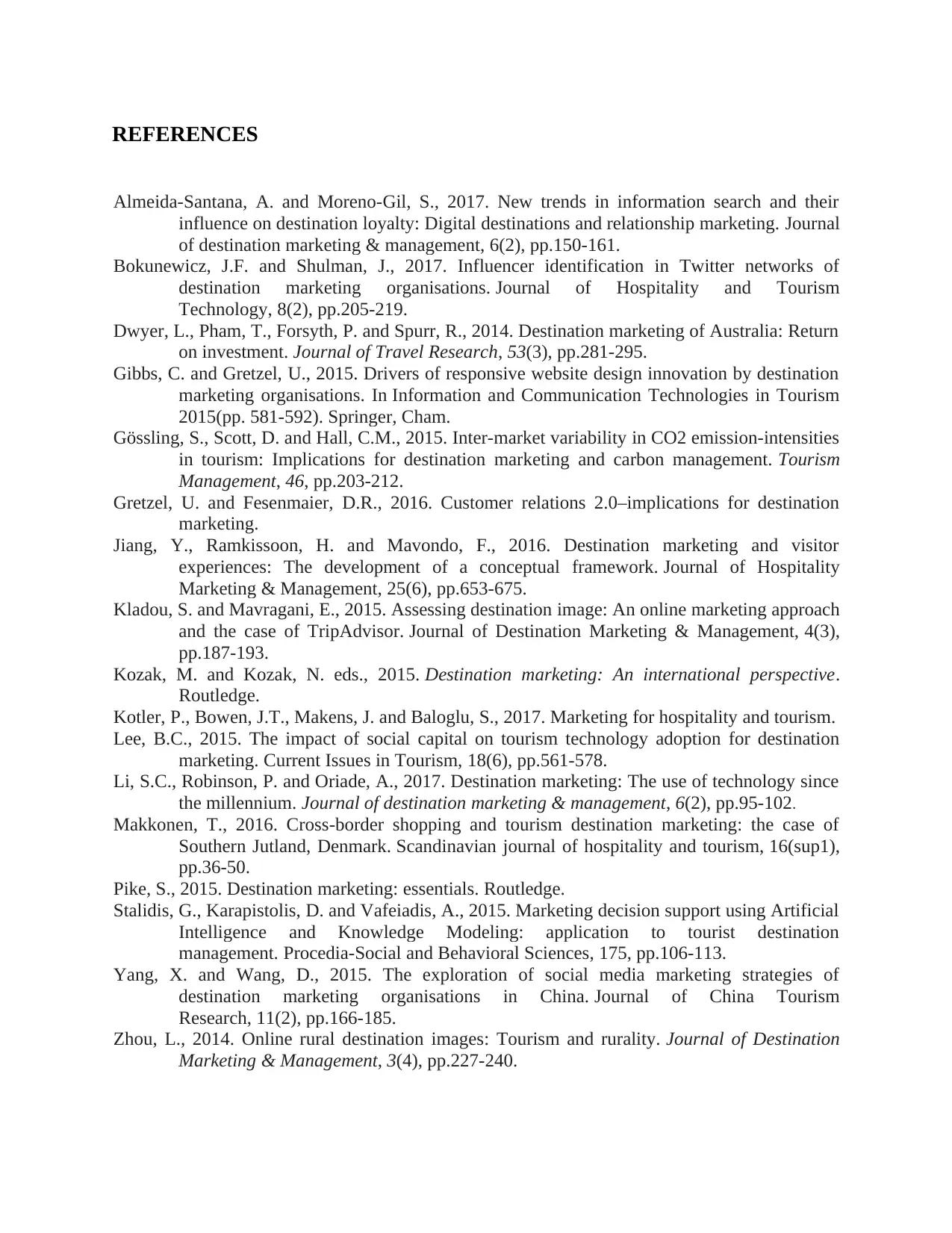
REFERENCES
Almeida-Santana, A. and Moreno-Gil, S., 2017. New trends in information search and their
influence on destination loyalty: Digital destinations and relationship marketing. Journal
of destination marketing & management, 6(2), pp.150-161.
Bokunewicz, J.F. and Shulman, J., 2017. Influencer identification in Twitter networks of
destination marketing organisations. Journal of Hospitality and Tourism
Technology, 8(2), pp.205-219.
Dwyer, L., Pham, T., Forsyth, P. and Spurr, R., 2014. Destination marketing of Australia: Return
on investment. Journal of Travel Research, 53(3), pp.281-295.
Gibbs, C. and Gretzel, U., 2015. Drivers of responsive website design innovation by destination
marketing organisations. In Information and Communication Technologies in Tourism
2015(pp. 581-592). Springer, Cham.
Gössling, S., Scott, D. and Hall, C.M., 2015. Inter-market variability in CO2 emission-intensities
in tourism: Implications for destination marketing and carbon management. Tourism
Management, 46, pp.203-212.
Gretzel, U. and Fesenmaier, D.R., 2016. Customer relations 2.0–implications for destination
marketing.
Jiang, Y., Ramkissoon, H. and Mavondo, F., 2016. Destination marketing and visitor
experiences: The development of a conceptual framework. Journal of Hospitality
Marketing & Management, 25(6), pp.653-675.
Kladou, S. and Mavragani, E., 2015. Assessing destination image: An online marketing approach
and the case of TripAdvisor. Journal of Destination Marketing & Management, 4(3),
pp.187-193.
Kozak, M. and Kozak, N. eds., 2015. Destination marketing: An international perspective.
Routledge.
Kotler, P., Bowen, J.T., Makens, J. and Baloglu, S., 2017. Marketing for hospitality and tourism.
Lee, B.C., 2015. The impact of social capital on tourism technology adoption for destination
marketing. Current Issues in Tourism, 18(6), pp.561-578.
Li, S.C., Robinson, P. and Oriade, A., 2017. Destination marketing: The use of technology since
the millennium. Journal of destination marketing & management, 6(2), pp.95-102.
Makkonen, T., 2016. Cross-border shopping and tourism destination marketing: the case of
Southern Jutland, Denmark. Scandinavian journal of hospitality and tourism, 16(sup1),
pp.36-50.
Pike, S., 2015. Destination marketing: essentials. Routledge.
Stalidis, G., Karapistolis, D. and Vafeiadis, A., 2015. Marketing decision support using Artificial
Intelligence and Knowledge Modeling: application to tourist destination
management. Procedia-Social and Behavioral Sciences, 175, pp.106-113.
Yang, X. and Wang, D., 2015. The exploration of social media marketing strategies of
destination marketing organisations in China. Journal of China Tourism
Research, 11(2), pp.166-185.
Zhou, L., 2014. Online rural destination images: Tourism and rurality. Journal of Destination
Marketing & Management, 3(4), pp.227-240.
Almeida-Santana, A. and Moreno-Gil, S., 2017. New trends in information search and their
influence on destination loyalty: Digital destinations and relationship marketing. Journal
of destination marketing & management, 6(2), pp.150-161.
Bokunewicz, J.F. and Shulman, J., 2017. Influencer identification in Twitter networks of
destination marketing organisations. Journal of Hospitality and Tourism
Technology, 8(2), pp.205-219.
Dwyer, L., Pham, T., Forsyth, P. and Spurr, R., 2014. Destination marketing of Australia: Return
on investment. Journal of Travel Research, 53(3), pp.281-295.
Gibbs, C. and Gretzel, U., 2015. Drivers of responsive website design innovation by destination
marketing organisations. In Information and Communication Technologies in Tourism
2015(pp. 581-592). Springer, Cham.
Gössling, S., Scott, D. and Hall, C.M., 2015. Inter-market variability in CO2 emission-intensities
in tourism: Implications for destination marketing and carbon management. Tourism
Management, 46, pp.203-212.
Gretzel, U. and Fesenmaier, D.R., 2016. Customer relations 2.0–implications for destination
marketing.
Jiang, Y., Ramkissoon, H. and Mavondo, F., 2016. Destination marketing and visitor
experiences: The development of a conceptual framework. Journal of Hospitality
Marketing & Management, 25(6), pp.653-675.
Kladou, S. and Mavragani, E., 2015. Assessing destination image: An online marketing approach
and the case of TripAdvisor. Journal of Destination Marketing & Management, 4(3),
pp.187-193.
Kozak, M. and Kozak, N. eds., 2015. Destination marketing: An international perspective.
Routledge.
Kotler, P., Bowen, J.T., Makens, J. and Baloglu, S., 2017. Marketing for hospitality and tourism.
Lee, B.C., 2015. The impact of social capital on tourism technology adoption for destination
marketing. Current Issues in Tourism, 18(6), pp.561-578.
Li, S.C., Robinson, P. and Oriade, A., 2017. Destination marketing: The use of technology since
the millennium. Journal of destination marketing & management, 6(2), pp.95-102.
Makkonen, T., 2016. Cross-border shopping and tourism destination marketing: the case of
Southern Jutland, Denmark. Scandinavian journal of hospitality and tourism, 16(sup1),
pp.36-50.
Pike, S., 2015. Destination marketing: essentials. Routledge.
Stalidis, G., Karapistolis, D. and Vafeiadis, A., 2015. Marketing decision support using Artificial
Intelligence and Knowledge Modeling: application to tourist destination
management. Procedia-Social and Behavioral Sciences, 175, pp.106-113.
Yang, X. and Wang, D., 2015. The exploration of social media marketing strategies of
destination marketing organisations in China. Journal of China Tourism
Research, 11(2), pp.166-185.
Zhou, L., 2014. Online rural destination images: Tourism and rurality. Journal of Destination
Marketing & Management, 3(4), pp.227-240.

1
⊘ This is a preview!⊘
Do you want full access?
Subscribe today to unlock all pages.

Trusted by 1+ million students worldwide
1 out of 12
Related Documents
Your All-in-One AI-Powered Toolkit for Academic Success.
+13062052269
info@desklib.com
Available 24*7 on WhatsApp / Email
![[object Object]](/_next/static/media/star-bottom.7253800d.svg)
Unlock your academic potential
Copyright © 2020–2025 A2Z Services. All Rights Reserved. Developed and managed by ZUCOL.





